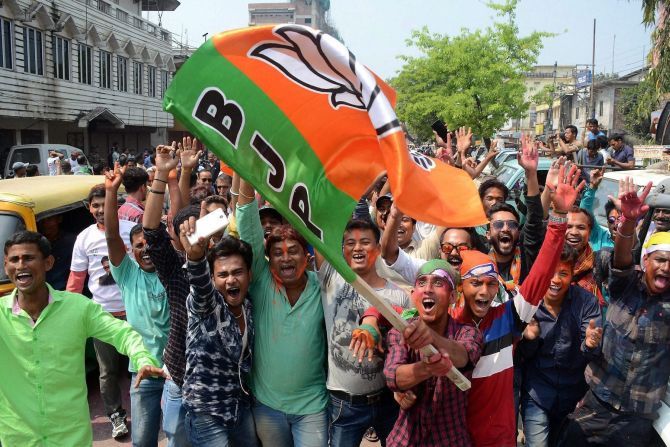'The BJP portrays a make believe world.'
'The Tripura victory is being seen by some as a result of bahubal and money power -- but that would be a very simplistic explanation.'
'Money and muscle power can play a role up to a point, but the BJP's victory is remarkable because it replaced a party that was in power for 25 years.'

IMAGE: BJP supporters celebrate the party's victory in Agartala, March 3, 2018. Photograph: PTI Photo
Dr Nanigopal Mahanta is head of the department of political science at the University of Gauhati.
The morning after the Bharatiya Janata Party scored a stunning victory in Tripura and began the process of forming governments in Meghalaya and Nagaland, Dr Mahanta -- an astute commentator on politics in the north east, spoke to Rediff.com's Archana Masih, explaining the factors for the BJP's steep ascent in the region.
How will the BJP victory change the north east?
This victory is a culmination of a thought process, a change in the attitude of the BJP to that of the Congress.
The north east was in the periphery of the national imagination.
Notwithstanding the fact that we had a prime minister who represented this region for 10 years (Dr Manmohan Singh, who was elected to the Rajya Sabha from Assam), this region had no value at all.
Since 2014 because of certain pro-active policies, it has come centre stage.
(Prime Minister Narendra D) Modi has changed this, in terms of perceptional understanding and real substantive issues of putting forward the Act East policy.
Has the BJP now conquered the north east, an outpost where it had no hope at one time?
The onslaught of the BJP in terms of a geographical expansion is more or less complete. It has become an all-India party, with the exception of the south.
Sunil Deodhar (the Rashtriya Swayamasevak Sangh pracharak credited as the architect of the BJP victory in Tripura) established BJP-RSS organisational links in the tribal pockets.
Himanta Biswa Sarma (Assam's finance minister and the BJP's north east strategist) successfully wove alliances. He adopted his technique of Assam in Tripura and was the master strategist.
In the 2013 election in Tripura, 49 of the BJP's 50 candidates lost their deposits. This election, the party triumphed. It provides a lesson in how elections are won, doesn't it?
In Tripura it is the first time that the BJP confronted the Left head on.
It is an ideological victory. Now Leftism exists perhaps in JNU (Jawaharlal Nehru University from where incidentally Dr Mahanta has an MA) and in certain universities.
The Tripura victory is being seen by some as a result of bahubal and money power -- but that would be a very simplistic explanation.
Money and muscle power can play a role up to a point, but the BJP's victory in Tripura is remarkable because it has replaced a party that was in power for 25 years.
What are the reasons then for the BJP win in Tripura?
- 1. Policy challenges.
- 2. Organisational expansion.
- 3. Strategy.
- 4. Alliances.
- 5. Politics of hope and aspiration.
Can you explain by giving examples of how this was brought about?
Tripura still gets the 4th Pay Commission in India. In Assam, the 7th Pay Commission is implemented phase-wise.
If you visit Tripura, the worst city of Assam would be like the best city of Tripura.
I give the analogy of the Soviet Union. With perestroika and glasnost, people suddenly saw development all around and realised they had been left behind.
The Soviet Union fell like a pack of cards.
Nobody doubts Manik Sarkar's personal integrity, but being honest by yourself is not a virtue unless you take the system along.
With economic principles of the 1950s-1960s, you cannot rule a state post-liberalisation; where people have seen the consequences of consumerism. The youth wants the good life.
What are the reasons for the CPI-M's loss?
The administration was party-centric.
If there was a law and order problem, you had to first go to the (CPI-M) cadre.
People kept silent because they expected a backlash by the Left cadre.
A vacuum was created and the Congress simply just gave in.
The Congress vote share has crashed from 32% to 1.8%.
It is role reversal. The BJP -- which had 1.5% (in the 2013 assembly election) -- has gone up to 48% with the IPFT (Indigenous People's Front of Tripura). The Congress has given up.
It has been a year since the BJP came to power in Assam. How has government functioning changed in Assam?
The changes are cosmetic rather than substantial. There is an attitudinal change.
Recently there was a large congregation of industry with 'Advantage Assam' as the slogan.
Guwahati has become one of the fastest growing cities. Political corruption has come down substantially.
There was a huge crackdown on the Assam Public Service Commission, but the impression is that the BJP is only after middle and lower level officers. The top brass go scot free.
In terms of roads and expansion of other activities, it is very incremental.
The crackdown on corruption has made administration shaky. The feeling is if they do something, they may land up in jail because no less than 500 to 600 officers have been arrested. Even administrative level officer are scared.
There are a lot of promises from industry -- Reliance, Patanjali, Spice Jet, Jindal -- the government still needs to be given time to deliver.
What are some of the other visible changes?
All of a sudden, there is great attention on Utsavs, Mahotsavs.
Assam must be a state with maximum festivals.
It is a diverse state with 65 communities and all have started coming out to celebrate festivals with government patronage.
I think there should be a separate directorate of festivals!
From October to April, we must be having 1,000 festivals at the sponsorship of the government.
This is the sudden activity of the BJP.
Is State patronage of these festivals a continuation of the BJP's Hindutva agenda?
I won't say they are expanding as a part of the Hindutva ideology, but people are getting encouraged.
People have come to this conclusion that the BJP will be in favour of encouraging festivals. It is good for tourism, no doubt.
What does the BJP victory in Tripura portend for Mamata Banerjee in Bengal?
The BJP's inroads into Bengalis is very systematic.
Assam has a large number of Bengalis. They were previously with the United Minority Front, now they are with the BJP.
In Tripura, there are around 70% Bengalis, and the BJP has got their support.
This systematic takeover of the Bengalis will certainly have a psychological advantage for the BJP in Bengal, because there is an organic link between the Bengalis of West Bengal and Tripura.
The raja of Tripura was the patron of Bengali culture. Rabindranath Tagore was very connected with Tripura.
During British times when there was no Bangladesh, there was a direct link between Calcutta and Tripura.
Assam is not as connected with Bengal as Tripura because there is a history behind that.
Patronage by the king resulted in Tripura becoming a hub of Bengali culture.
How will the BJP work with the IPFT which wants a separate state? Can it alienate the Bengalis who voted for the BJP?
This is a fallacious argument. They (the IPFT) are not separatists or secessionists. They have serious identity questions.
From 50%, the tribals have been reduced to 22%.
Just because they demand a separate state does not mean that it will be given to them.
It is wrong that some people are equating them with Kashmiri secessionists. They have not demanded a separate country.
The history of the north east shows that it is due to the process of negotiation and dialogue that they have come to the mainstream. You can't call them separatists.
The Naga problem has existed for 70 years. Today, they are in the mainstream.
The issue is going to be resolved, it is wrong to equate them (the IPFT) with separatists and secessionists.
Their (tribal) population domination has been affected due to the refugee problem from Bangladesh and they have been reduced to a minority.
Territorial, identity, population issues are crucial to the tribals.
This country has been divided into states on linguistic lines.
On one hand, you say language and identity is important and then you blame the tribals if they espouse this cause.
Demand for a separate state is within the ambit of the Constitution of India.
The BJP is in a better situation to resolve this contradiction between the Bengalis and the tribals. Both Bengalis and the tribals are with the BJP.
The BJP is in power both in Nagland and Manipur. How will this facilitate the Naga Accord becoming a reality?
I see a better future. The problem goes back to the 1930s.
In 70 years, the Congress has done little. The Naga problem is going to be resolved in 6, 7 months. There will be a new government in Nagaland.
The Naga issue is in the final stage of settlement. I feel they are going to make the Naga Peace Agreement public.
Like in Assam when the Assam Accord was signed in 1985, a new party -- the AGP (Asom Gana Parishad) -- came up and came to power. I see a similar situation in Nagaland.
Is this end of Marxism in Tripura?
I won't say that. With imported ideology, an irrelevant thought process and if you don't learn from your mistakes then you are done.
They (the Communist Party of India-Marxist) still have 41% of the vote, but it is an entirely new game of politics.
The BJP is too smart. It portrays a make believe world. The Marxists portray themselves as a personification of simplicity, which is not an end in itself.
The Congress has been wiped out in the north east. It only has Mizoram, which goes to the polls later this year. What is its future in the north east?
The Congress revival is based on if and then.
The Congress had a pan-Indian presence because of strong leadership, strong regional satraps and strong organisational connect with the grassroots.
All of these are missing today.
Rahul Gandhi is an apolitical person. He does not understand politics. He is an absentee politician.
The last strong bastion for the Congress is perhaps the Punjab CM.
When a party is demoralised and projected as defeatist, who will listen to you?
It is the general tendency of people to ally with a strong personality, not with a weak, submissive personality.
All these factors, I am afraid, are missing from the Congress.
The Congress will revive only out of default, that is if the BJP nose-dives and becomes pathetic.
You don't know -- that might very well happen. But for that to happen will take some time.











 © 2025
© 2025